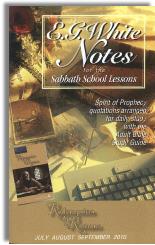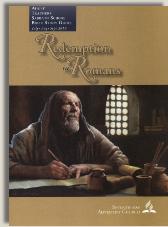|
||||||||||||||
Commentary on "All the Rest Is Commentary"
Day 5: Wednesday, September 22, 2010 - Observance of Days
Overview
In Romans 14:5, Paul says:
“One person esteems one day as better than another, while another esteems all days alike. Each one should be fully convinced in his own mind.”
The Lesson states: “To bring the weekly Sabbath into Romans 14:5, as some argue, is unwarranted. Can one imagine Paul taking such a laid-back attitude toward the fourth commandment?” Moreover, in Romans Paul has strongly emphasized obedience to the law, so he wouldn’t place the weekly Sabbath in the same category as questions on food sacrificed to idols."
Observations
Our question deals with Paul’s statement about days, that some esteem one day as better, while others consider all days alike. Observance of days must be ruled by individual conscience, for “each one should be fully convinced in his own mind.” Paul does not press his own opinion about keeping days here. This raises a question about the weekly Sabbath: how can Paul say that some consider every day alike when the Ten Commandments have clearly stated that the 7th day is holy? Seventh-day Adventists believe that the 4th Commandment is to be observed universally for all eternity. Verse 5 must refer, they would say, to feast days, and not the 7th day.
The Lesson finds it unimaginable that Paul was referring here to the 7th day, because Paul has so strongly promoted obedience to the law in the rest of Romans. SDA theology stands or falls on Sabbath-keeping, so the Lesson cannot consider any other interpretation. When we read the Word of God, however, we want to learn what is really being said, whether or not it supports our doctrinal pillars. Our imaginations or church doctrines are not our scriptural guides, but the plain words of God, by the Spirit.
Clearly, Paul agrees with the strong in faith in matters of interpretation, for he has stated here that the strong in faith consider every day alike. The strong do not limit their worship to particular days, just as they do not limit their diets to vegetables alone. If Paul held the 7th day as better than other days, he would surely be reckless in supporting believers who esteemed “all days alike.”
This text (vs. 5) fits well with Colossians 2:17, where Paul tells them not to allow anyone to judge them “with regard to a festival or a new moon or a Sabbath.” In this text “Sabbath” also means the 7th day, otherwise, by putting both “festival” and “Sabbath” in the same sentence, he would be repeating himself. Again, in Galatians 4:10, he protests, “You observe days and months and seasons and years! I am afraid I may have labored over you in vain.” In all three of these passages we have Paul objecting when Christians made the keeping of holy days an obligation. Paul never in his writings taught keeping any day holy, including the 7th day. If his gospel required that the 7th day be kept, it would have been necessary to teach its observance to the many Gentiles that he ministered to. It is most significant that he did not.
The Sabbath has not been abolished into oblivion, it has been fulfilled by Christ and elevated to the absolute, to the worship of the Father in spirit and in truth (John 4:23,24). Now worship is from our own “inner man,” not in special times or places (Acts 17:24,25), with external behaviors that others can judge us for. True worship is a continual rest in Christ, the only One who gives us rest from our labor (Mt. 11:28,29).
Christian maturity is not characterized by increasingly scrupulous behaviors and stricter abstinence, that would be the opposite of the message of Romans 14. Mature believers have liberty that is governed by protection of the less mature. Privately, they reserve the liberty to use all foods when we consecrate it with thanksgiving to God (I Tim 4:1-5). Likewise, if we have strong faith we enjoy liberty with our time, acknowledging that our Lord owns every day and minute of our lives. Through Jesus’ death and resurrection, God will freely give us all things (Rom. 8:32).
Summary
- The plain words of scripture must guide our interpretation, not our wishes or church doctrines.
- Paul agrees with those who do not keep holy days and consider all days alike.
- Paul did not teach Sabbath-keeping to the Gentiles at any time, and consistently objected to those who would enforce holy days.
- The Sabbath has been fulfilled by Christ and elevated to spiritual worship, independent of times and places.
- Christian maturity is characterized by liberty, concern for others, and gratitude to God.
Copyright 2010 BibleStudiesForAdventists.com. All rights reserved. Revised September 23, 2010. This website is published by Life Assurance Ministries, Glendale, Arizona, USA, the publisher of Proclamation! Magazine. Contact email: BibleStudiesForAdventists@gmail.com.
The Sabbath School Bible Study Guide and the corresponding E.G. White Notes are published by Pacific Press Publishing Association, which is owned and operated by the Seventh-day Adventist church. The current quarter's editions are pictured above.
Official Adventist Resources
Standard Edition Study Guide Week 13
Teacher's Edition Study Guide Week 13
Easy Reading Edition Study Guide Wk 13
Search the Complete Published Ellen G. White Writings


